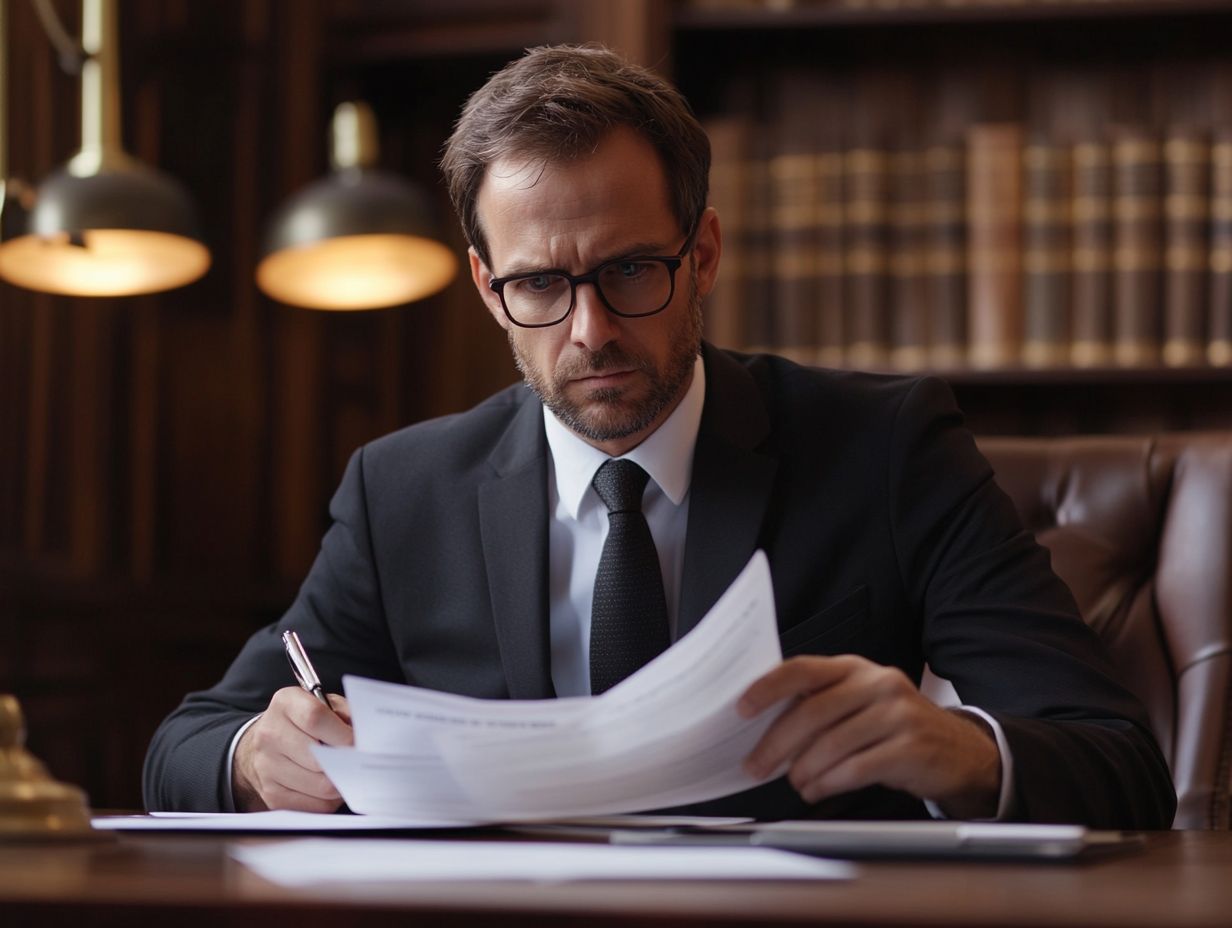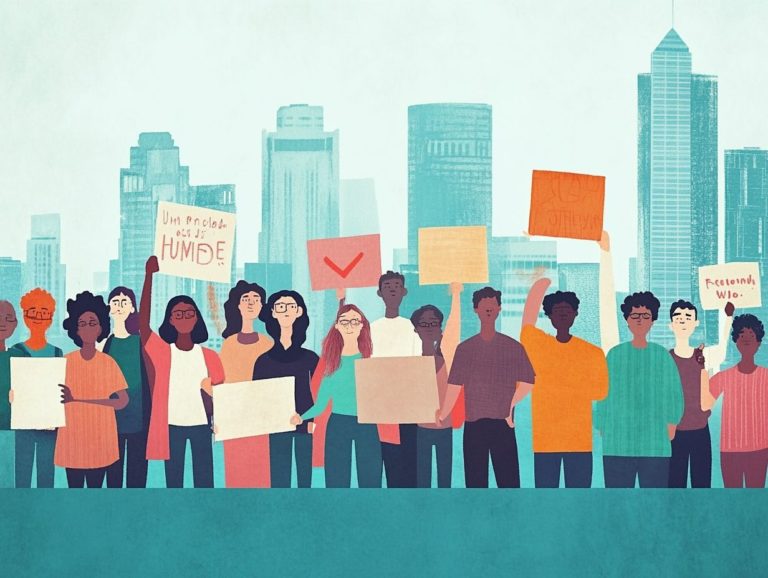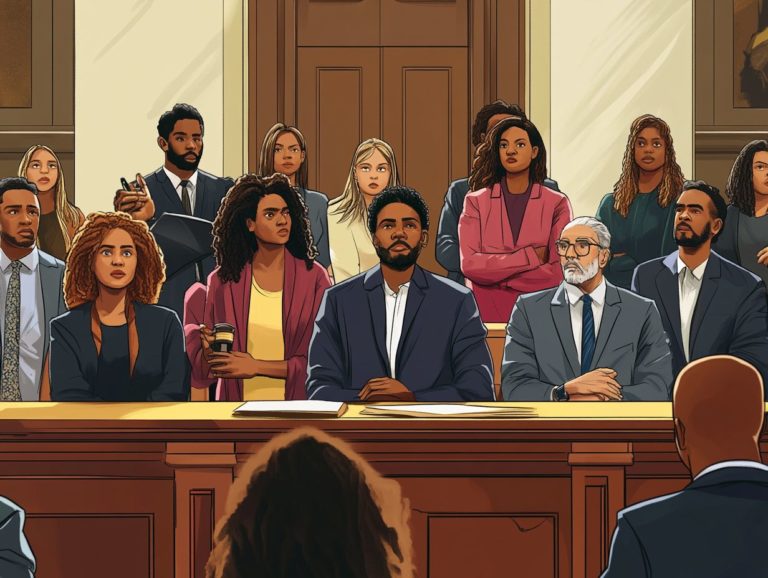The Role of Legal Counsel for the Accused
Facing criminal charges can feel overwhelming. Securing effective legal counsel is vital.
This article explores the indispensable role of legal representation for the accused. It emphasizes the significance of protecting your rights and ensuring a fair trial. Experienced counsel will guide you through the legal process and help craft a strong defense strategy tailored to your situation.
You will learn the key qualities to look for in a legal advisor and receive practical tips for finding the right fit. Whether you’re facing legal challenges or simply seeking knowledge, understanding the role of legal counsel empowers you on your journey.
Contents
- Key Takeaways:
- Why is Legal Counsel Important?
- The Role of Legal Counsel in the Criminal Justice System
- Qualities to Look for in a Legal Counsel
- How to Find and Hire Legal Counsel
- Frequently Asked Questions
- What is the role of legal counsel for the accused?
- Why is it important to have legal counsel for the accused?
- Can an accused person represent themselves in court?
- What are the duties of a legal counsel for the accused?
- What qualities should I look for in a lawyer for the accused?
- How can I afford a lawyer for the accused?
Key Takeaways:

- Legal counsel is essential for protecting the rights of the accused and ensuring a fair trial.
- In the criminal justice system, legal counsel guides the accused through the legal process and builds a defense strategy.
- When searching for legal counsel, consider experience, expertise, communication skills, and trust.
What is Legal Counsel for the Accused?
Legal counsel for the accused isn’t just helpful; it’s a fundamental right under the Sixth Amendment of the U.S. Constitution. This guarantees that every criminal defendant, regardless of finances, has access to effective legal representation throughout the judicial process.
Landmark cases, like Gideon v. Wainwright, reinforce this right. They mandate that states provide court-appointed counsel for those unable to afford an attorney, upholding the principles of due process.
Legal counsel is a crucial safeguard against the complexities of the legal system. It equips defendants with the expertise necessary to navigate the intricacies of law. Without adequate representation, individuals face devastating outcomes, including wrongful convictions and excessively harsh sentences.
The importance of the Sixth Amendment is clear. It champions equality under the law, allowing those without financial resources to defend themselves effectively.
Cases like Gideon v. Wainwright show the evolving interpretations of this right, reflecting society’s growing recognition of the need for fair legal support to uphold justice and maintain public confidence in the legal system.
Why is Legal Counsel Important?
Legal counsel is essential for safeguarding the rights of the accused. It guarantees fair representation against what can often feel like an overwhelming prosecution, addressing the inherent imbalance between prosecution and defense within the criminal justice system.
Protecting the Rights of the Accused
The rights of the accused form the foundation of the American legal system. They are designed to shield individuals from wrongful convictions and guarantee due process through proper legal representation.
These rights, enshrined in the Sixth Amendment, provide essential protections such as the right to a speedy trial, the right to confront witnesses, and the right to obtain counsel. Without competent legal counsel, protecting your rights can be a struggle.
For example, without an attorney, you may be ill-equipped to challenge inadmissible evidence or cross-examine witnesses effectively. This absence of representation can lead to unwarranted delays, coercive plea deals, and even the loss of your chance to mount a robust defense.
Having skilled legal support not only protects your rights but also strengthens the integrity of the justice system as a whole.
Ensuring a Fair Trial
Ensuring a fair trial is one of your legal counsel’s primary roles. Effective lawyers strive to balance the scales of justice in a criminal justice system that often leans toward the prosecution.
This crucial responsibility encompasses several key elements, such as impartiality and guaranteeing that both parties have an equal opportunity to present their case.
Your legal representation plays an invaluable role here. With an informed advocate by your side, navigating the complexities of the law becomes manageable, ensuring that you are adequately represented throughout the proceedings.
The right to contest evidence is vital, allowing your defense lawyer to challenge the validity and integrity of the evidence presented against you.
By skillfully questioning witnesses and carefully reviewing the details of the process, your legal counsel actively contributes to these essential elements, thereby reinforcing the very foundation of justice.
The Role of Legal Counsel in the Criminal Justice System

Legal counsel serves a crucial function in the criminal justice system, acting as the primary advocate for the accused and ensuring that their rights are upheld throughout the entirety of legal proceedings.
Guiding the Accused through the Legal Process
Guiding you through the legal process is a fundamental responsibility of your legal counsel. They must expertly navigate court procedures to ensure that your interests are represented at every stage.
From the moment you face arraignment the first court appearance where charges are read your attorney explains the charges and consequences, enabling you to make informed decisions about your future.
During hearings, they provide strategic insights into plea options and assist you in discerning the best path forward, all while keeping you fully aware of how each choice impacts your case.
In terms of trial preparation, your counsel is instrumental in building a strong defense. They highlight the importance of gathering relevant evidence and preparing witnesses.
By offering clear insights into what to expect, legal professionals enable you to approach the legal system with confidence and clarity.
Building a Defense Strategy
Building a robust defense strategy is crucial for you and your lawyer. It requires a deep understanding of the case, evidence, and applicable laws to effectively represent you in court.
It all starts with meticulous evidence gathering. Every single piece of information you collect can sway the outcome. Whether it s scrutinizing police reports, digging into investigative files, or analyzing surveillance footage, no detail is too small.
Next, you ll focus on witness preparation. Here, your lawyer’s expertise shines as they guide those who will testify, ensuring their accounts are both clear and credible.
Each step demands careful consideration; the specific nature of the charges can significantly influence your strategies. Having a skilled lawyer with expertise in criminal law not only enhances your defense but also provides you with invaluable insights into navigating complex legal landscapes. This ensures that your rights are vigorously upheld throughout the process.
Qualities to Look for in a Legal Counsel
When you seek legal counsel, it s crucial to reflect on the qualities that define an effective lawyer. These attributes can profoundly influence the quality of your legal representation and the ultimate outcomes of your case.
Experience and Expertise
Experience and expertise are crucial when selecting legal counsel. A seasoned criminal defense attorney brings invaluable knowledge of the law and court procedures to the forefront.
Their familiarity with the nuances of similar cases instills confidence in you and enhances their strategic capabilities. When you face legal challenges, having someone who can deftly navigate the complexities of the legal system is essential.
They ll utilize their understanding to pinpoint potential weaknesses in the prosecution’s case. A lawyer with relevant experience can draw on past successes to craft compelling arguments, often leading to more favorable results for you.
Ultimately, their depth of understanding not only influences the trajectory of your case but can also have a significant impact on the outcome.
You deserve to have a strong defense strategy. If you need legal representation, seek counsel today.
Communication and Trust

Effective communication and trust between you and your legal counsel are crucial. They lay the groundwork for a productive attorney-client relationship that can significantly impact the legal process.
When your legal representatives actively listen and engage with thoughtful questions, they gain valuable insights into your unique situation and concerns. This is vital for crafting a defense strategy tailored just for you.
This rapport not only reassures you but also encourages you to share critical information that might otherwise stay hidden.
Demonstrating transparency throughout the legal process and providing regular updates can help you feel more informed and involved. As mutual trust develops over time, you ll gain confidence in your attorney s abilities. This makes it easier to lean on their advice and strategies during what can often be an overwhelming experience.
How to Find and Hire Legal Counsel
Finding and hiring the right legal counsel is an essential step for any criminal defendant. This process demands thorough research and often relies on recommendations from trusted sources.
These steps ensure you secure effective representation that can make all the difference in your case.
Research and Referrals
Conducting comprehensive research and seeking referrals is essential when you re looking for legal counsel. These steps will help you identify qualified lawyers who have a good history.
By leveraging online reviews and legal directories, you can gather valuable insights into an attorney s expertise and client satisfaction levels.
Engaging with forums and social media platforms provides you with diverse perspectives, allowing you to gauge the attorney’s reputation within the community.
Networking with friends, family, or colleagues who have faced legal challenges can yield invaluable referrals. These trusted sources can share firsthand experiences, ensuring that the attorney you choose has the necessary skills and fosters a good rapport.
This rapport is an essential factor for effective communication during complex legal proceedings.
Consultation and Decision Making
The consultation phase is a crucial step in hiring legal counsel. It gives you the opportunity to evaluate the lawyer s approach and determine their potential as an effective advocate for your case.
During this initial meeting, it s vital for you to prepare a list of relevant questions. These questions should dive into the attorney s experience with similar cases, their defense strategies, and their communication style.
This preparation not only offers valuable insights into the lawyer s capabilities but also clarifies what you can expect as you move forward.
Observing the attorney’s responsiveness and willingness to listen can greatly influence whether they are the right fit for your case.
By engaging in a well-considered decision-making process during this consultation, you can pave the way for better outcomes. This ensures that you feel confident and supported throughout your legal journey.
Frequently Asked Questions
What is the role of legal counsel for the accused?

The role of legal counsel for the accused is to provide legal representation and advice to individuals charged with a crime. This includes ensuring that their rights are protected, analyzing evidence, and building a defense strategy.
Why is it important to have legal counsel for the accused?
Hiring skilled and experienced legal counsel is crucial for the accused. They have the knowledge and expertise needed to navigate the complex legal system.
They can protect the rights of the accused and provide a strong defense against the charges.
Can an accused person represent themselves in court?
Yes, an accused person has the right to represent themselves in court, but it is highly discouraged. Legal proceedings can be complex and overwhelming.
Having professional legal counsel can greatly increase the chances of a favorable outcome.
What are the duties of a legal counsel for the accused?
A legal counsel for the accused has many duties. These include conducting legal research, preparing legal documents, advising the accused on their rights, negotiating plea deals, and representing them in court during all stages of the legal process.
What qualities should I look for in a lawyer for the accused?
Choose a lawyer who has experience and a solid reputation.
Excellent communication and negotiation skills are crucial for building a strong defense.
How can I afford a lawyer for the accused?
If hiring a lawyer is beyond your budget, consider a court-appointed attorney.
You can also reach out to legal aid organizations or pro bono lawyers who offer free or reduced-cost services.






